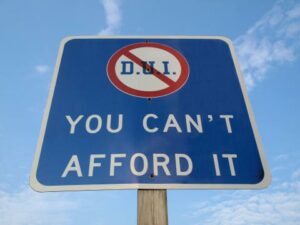 A conviction for driving under the influence can wreck more than your car: it can damage your credit.
A conviction for driving under the influence can wreck more than your car: it can damage your credit.
While a DUI (or DWI — driving while intoxicated) won’t show up directly on your credit report or get factored into your score, the financial ramifications could hit your credit hard.
“A DUI can have a catastrophic effect on your finances,” says Carole Walker, executive director of the Rocky Mountain Insurance Information Association. “So, take that into account before you get behind the wheel.”
Even for a first drunken driving arrest with no wreck or injuries, costs can rack up quickly. For example, the total cost of a drunken driving conviction in Illinois averages about $16,500, according to the 2014 Illinois DUI Fact Book, published by the state.
“The steep cost and the fact that most DUI expenses can be paid with a credit card make it easy to get deep in debt if your finances are shaky,” says Kevin Haney, a credit industry expert and publisher of SavvyonCredit.com…
In a best-case scenario, a person who gets arrested for driving while intoxicated might have the funds to cover costs, and the conviction might have no effect at all on their credit report or score, Haney says. However, in other cases, a drunken driving conviction can lead to credit consequences that can range from minor to major, Haney says.
For example: Charging big expenses could lead to a dip in score. Using your card to pay thousands of dollars in lawyer fees, alcohol education tuition and fines will increase your utilization ratio, which is the amount of available credit you’re using, Haney says. That can cause your credit score to drop, he says.
The amount owed on accounts makes up 30 percent of your FICO score, according to myFICO.com. The FICO score takes into account factors such as total amount owed, how many accounts have balances and whether you’re close to maxing out cards.
Unpaid fines could get sent to collections. If you’re unable to pay your fines, the county likely will send the debts to a collection agency. A collection on your credit report can have a major negative impact on your score, according to Haney. Collections stay on your credit report for seven years, and the FICO score weighs recent collections more heavily.
A judgment could hurt your credit. A judgment can show up on your credit as a public record and can hurt your score, Haney says. Judgments stay on your credit report for seven years, whether they’ve been paid or not.
A conviction can kill your income.
In the short term, a driving-under-the-influence arrest and conviction can affect your ability to get to work and keep your job, Walker says. And no job equals no income to pay fees, fines or credit card bills…
As some DUI defense attorneys are fond of saying, you may be better off facing a felony burglary charge than getting nailed for a misdemeanor DUI.
You can’t afford a DUI. Let John Bateman be your ally. For more Information contact John Bateman, Attorney at Law, today! 844.DUI.Ally
